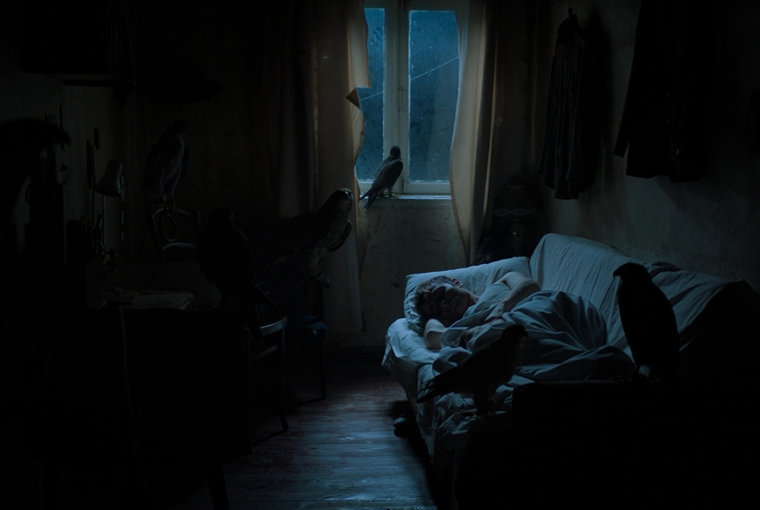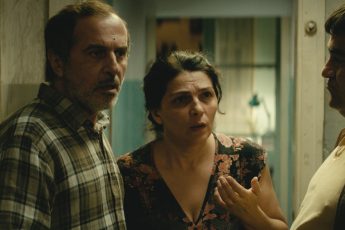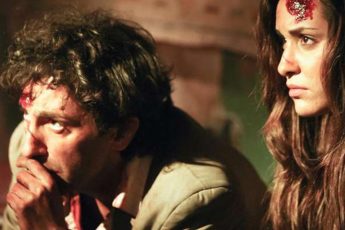Blurred Subjectivity and Fake Realism
Dmitry Mamuliya’s The Criminal Man (Borotmokmedi, 2019)
Vol. 99 (November 2019) by Lucian Tion
A factory worker witnesses the murder of a football goalie committed mafia-style by a team of what are apparently local mobsters. The barren hills where the murder takes place, add to a sense of mystery not dispelled by Georgian director Dmitry Mamuliya over the course of the remaining two hours of running time. Instead, he chooses to focus on the inner turmoil of the witness, who, obsessed with the easiness with which the murder was committed, begins envisaging what it would be like to become a criminal himself.
Overall, from this point little happens to sidetrack Giorgi Meskhi (played with obdurate calm by Giorgi Petriashvili) from gradually sliding into the abyss of a criminal’s mind. He visits the relatives of the deceased to study their psychology and attempts to empathize with their grief. But when this doesn’t seem to take him anywhere, he resolves to buy a gun, hoping the act might offer him, if not an understanding of his kin (with whom he can’t communicate), at least a potential understanding of his own self.
The film’s premise is strong. Faced with a dead end job, and missing the human warmth that would adduce some meaning to their lives, society, cold and uncaring, pushes individuals to create meaning out of their otherwise futile existence. We have seen this before. If not in the many adaptations of Crime and Punishment, at least in the equally gruesome exploration of the criminal mind in Wim Wender’s The Goalie’s Anxiety at the Penalty Kick. Adapted from a book by Peter Handke, that film tells the story of a down-and-out football goalie (is the parallel coincidental?) who resolves to kill a prostitute for no apparent reason. Handke’s study, however, focusses on the aftermath of the murder, and on the protagonist’s attempt to hide from his pursuers while coming to terms with the consequences of his act. Different in scope for that reason, Mamuliya’s story is Dostoyevskian: it follows the tribulations of a criminal mind as it undergoes the process of change, from the initial disconnect with society to the frightening act of decision-making – the committing of the murder itself.
What Mamuliya has trouble portraying, however, is a more sympathetic picture of this process. Not that murder in itself is sympathetic. But both Dostoyevsky and Handke offer a humanized version of the criminal, in that even if their protagonists lack a motive (less so in the case of Raskolnikov), the characters are presented as human beings who are clearly in the throes of despair. While Giorgi is equally alienated by society, what he lacks is not just a motive, but so much as a convincing reason for opting for a criminal life.
This unconvincing portrayal may also be due to the director’s clear choice of rendering his protagonist’s thought process as distant from the audience as possible. Giorgi is rarely heard expressing his thoughts, which leads us to believe that all his decisions derive from the surroundings in which he is forced to play his (unsatisfying) societal role. But while subjectivity is alluring in our reading of Giorgi, it hardly brings us closer to an emotional understanding of the protagonist. In opting for an intellectualist approach to his character, Mamuliya ends up making his story not only cold, as befits the context, but also artificial.
It is the same predilection for intellectualism that may explain the film’s slow pace. While Eastern European cinema has recently made us privy to many stories in which slowness offers the audience an advantageous vantage point from which to peer into the unseen inner world of exciting screen personas (Mungiu’s or Puiu’s films come to mind), Mamuliya’s protagonist cannot boast the same photogenie as the characters of the Romanian New Wave. While Giorgi is intentionally made into a blank screen onto which the spectator can project his or her voyeuristic (or criminal) fantasies, she will find very little desire to engage in this most basic of cinephilic acts.
The universe Mamuliya strives to create offers a subjective realism that slows down spectatorial perception to allegedly match that of the screen characters. And while this is commendable in itself, it unfortunately feels as though the director, out of too much zeal for advancing a subjective portrayal of his character, settles for a type of reality that feels fake for that very reason. Too concerned to depict his protagonist’s inner life, Mamuliya sacrifices the portrayal of an external reality that would have been vital to understanding the protagonist’s mind in this particular case. This has a detrimental effect for the style of the film, especially its realist aspirations. Caught in a fuzzy spot somewhere between Ceylan and Wenders, with influences from a diluted version of the Romanian New Wave, The Criminal Man lacks something both down-to-earth and thoroughly gruesome to elevate it to the same level as that frequented by the more seasoned practitioners of the genre.




Leave a Comment